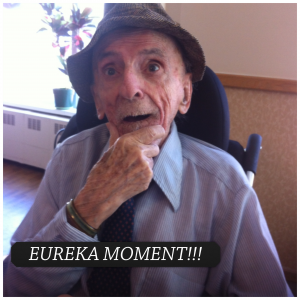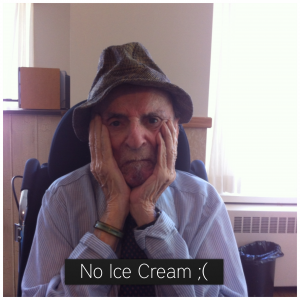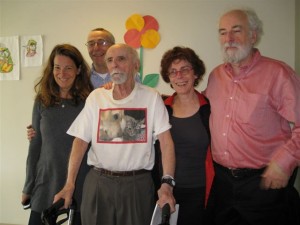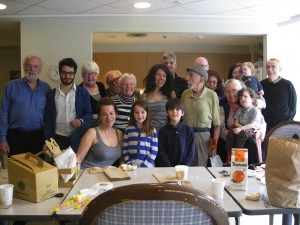[Message started at about two in the morning, Saturday, July 27, 1996.
Finished at ten after four.]
The one thing I shared with Bucky Fuller was an inordinate love of
coincidence. and tonight I experienced a fabulous one. It’s so great
that, although it relates to something I wrote specifically to you just
twenty-six or so hours earlier, I’m compelled to share it with the whole
list – particularly as it provides a first instalment on the story Vronk
most recently demanded.
It shouldn’t really have happened; by rights I should now be sleeping in a
lodge up in Muskoka, but I chickened out from going up there with your
mother and Judy’s family because I so much dislike travelling.
I’m going to have to give you a lengthy essay one of these days just on
that topic, because I started travelling at about the age of two (and seem
to remember being carried across a river into Germany on the shoulders of a
man helping Zaidie do a Bill Clinton – that is, evade military service). I
don’t seem ever to have stopped travelling thereafter, even doing it for a
living, first in the Deparment of Highways, where my insistence on
examining every mile of highway that I was supposed to give advice about
was turned into departmental policy by the Deputy Minister for all
engineers (you remember, David, that as a kid you loved some of those
trips, and, I must say, learned a surprising amount on how to interpret a
landscape); and then at York, where as a transportation and recreation
geographer I felt I had to make similar reconnaissance all over the world.
It is only during these last thirteen wonderful years of retirement that I
have at last been freed from having to bustle around. From your own
experience you know how hard it is to dislodge me from 22 Whitelock even
for a trip downtown.
This travel phobia even extends to the business of moving house. Vronk
mentions 203 Douglas Drive. A penetrating insight. Before living there I
had never had the pleasure of staying as long as three years in one
residence. In the last forty-five years your mother and I have owned and
lived in just two homes – in fact, since you were born, only three – not
counting the nine months each when I taught in Seattle and was on
sabbatical in Provence. My brother and sister have happily beat me in that
respect, having had just the one permanent residence for a longer period
than I did. Is there some significance in that? They too had had a
somewhat nomadic existence in youth, though not quite as extreme or
traumatic as mine. Let’s not push it: they love to travel.
So now, let me stop the kind of travel I do indulge in, the travel through
time, and turn to the passage I referred to when I began:
>As you well know, I’m abnormally drawn to books. Bubie’s [I’ve corrected
>the error in the original, where I said “your mother’s”] sister Simele
>had a remarkable collection of books (in retrospect, it seems to me that
>it may have been my cousin Sylvia’s doing; the nine years she had on me
>gave her a good head start in the literature department). I remember the
>fascination with which at around ten years old I stood riveted before her
>bookshelf, reading passages in two volumes that have been touchstones ever
>since.
>The first was a book by Judge Lindsay that predated the sexual revolution
>by half a century (it had just been published when I read it, in about
>1928). “Companionate Marriage” persuaded this ten-year-old that it was
>idiotic to sign a life contract with someone whom you are by religious law
>enjoined from living with for a while beforehand, so the two of you can
>find out whether you will be able to stand each other over the long term.
>Plus, if you discover you made a mistake, tough titty: the two of you,
>says your priest, minister, rabbi, are stuck with each other for the rest
>of your lives. (As you see, Zaidie wasn’t the only culprit responsible
>for my lifelong detestation of all things religious.)
>The other book was “The World as Will and Idea” by the
>nineteenth-century German-Jewish philospher Arthur Schopenhauer. What I
>took away from him is that if you are too much influenced by what you
>think others will think of you, you are mortgaging your life (my term, not
>Schopenhauer’s) to the people whose good opinion you are courting. Fifty
>years later I was able to equate Schopenhauer’s words with Maslow’s. It
>seems to me that the latter’s ideal “inner-directed man” is very much
>along the lines of Schopenhauer’s ideal je m’en fiche type. Funny thing,
>the influence plus the similarity seems to have shown: one graduate
>student claimed that I was the most inner-directed person he’d ever known.
>I guess that was his version of that undergraduate’s assessment:
>”Professor Wolfe, you’re a shit, but you’re a good shit.”<
I quote more than I strictly need, but I wanted to give you the context.
Now, picture this: I’m sitting at home instead of up there in Muskoka,
tired from the regular Friday night tennis and sleepy because it’s quarter
after one in the morning. Lackadaisically I do some channel surfing.
Suddenly there is my alter ego – I’m as small as he is, as grey and bearded
and bald as he is, and every bit as nasty. There he is, on the Tom Snyder
late late late show on CBS, spouting exactly the same kind of disgusting
atheistic mankind-hating, Swiftian stuff that I do. He doesn’t quote
Walter Raleigh’s
I wish I loved the Human Race;
I wish I loved its silly face;
I wish I liked the way it walks;
I wish I liked the way it talks;
And when I’m introduced to one
I wish I thought, *What Jolly Fun*!
He doesn’t quote those words; he doesn’t need to, having plenty of good
vitriolic words of his own.
But if he knows them they probably give him a shudder, as they do me: for
these are words
WISHED AT A GARDEN PARTY, JUNE 1914.
Come to think of it, there is a pretty horrific coincidence right there,
because these words aare almost a prophecy of things to come *right away*:
the shit hit the fan only two months or so later, and we’ve been wallowing
in it ever since.
So here is George Carlin, whom I first became aware of as the phony Indian
in “Outrageous Fortune” who guides Shelly Long and Betty Midler, and whom
I’ve admired fervently ever since, here he is pouring venom over his own
country’s individualism and competitiveness and the whole shmeer, and then,
to illustrate what should be rather than what is, he invokes Maslow’s
self-actualized man. Bingo!
Look back at that quotation from my message: see Maslow up there? How
often do you see Maslow invoked these days? Anywhere? Especially on
television? More especially on one of these brain-dead late night talk
shows (the very thought of David Letterman makes my skin crawl)? At
quarter after one in the morning? And here, one lousy day (plus two lousy
hours) after I invoke Maslow, for the first time probably in twenty years,
and I get him wrong, wonderful coincidence helps me get him right: it’s not
“Maslow’s inner-directed man,” it’s “Maslow’s self-actualized man.”
Of course, I knew that all along. So where does this inner-directed stuff
come from? Maybe from Maslow too (it’s been very many years since I read
him), but the self-actualized human being is at the top of his five-step
pyramid.
* * * * * * * * * * * * * * * *
A note for Suzenkaleh. My cousin Sylvia. the lifelong closest friend and
finally the caretaker of my aunt (or, if she was to be believed, my
half-sister) Minnie, was never Sylvia to me; she was Surke. And her sister
Ida, two or three years younger than me, was Khaieshi.
This four-year-old (which is what she was when I first knew her, at her
mother’s house on 879 Dundas Street West where we first lived on arrival in
Canada) had the most delightful way of kissing that the world has ever
known: she twisted her lips into a tiny figure-eight! It was through her,
also, that I gained an inkling into what I learned in detail many years
later, that I had dreadful instincts and must never become a businessman.
When we came to Canada I quickly learned the value of money. Once she had
a dime and I had a nickel, and I easily got her to trade, by telling her
the nickel was worth more because it was bigger. Talk about having things
on your conscience….
Khaieshi is the widow of a highly respected theoretical physicist, Jake
Kastner, whom on first meeting I irreverently thought of as “Brass Buttons”
Kastner, because the Army captain’s uniform on his stocky figure shone so.
Now their son is a highly respected theoretical physicist.
If you saw that lovely actress, Joan Plowright, the widow of Laurence
Olivier, walking on the street with Khaieshi you wouldn’t know which was
which. OK, so I exaggerate – but then I can’t tell Jackie and Nikki apart
either.
The Good Shit
Thanks to Chris Furedy for finding this on the York U server!



